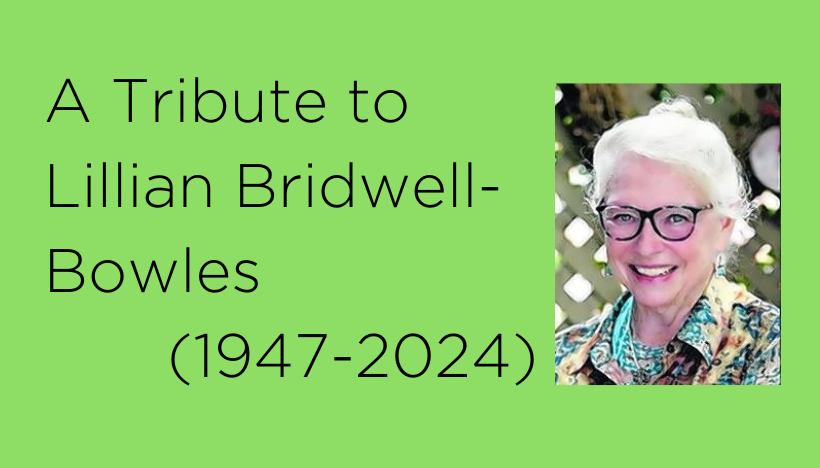This post was written by Doug Hesse, a past President of NCTE and former CCCC Chair.
When Lillian Bridwell-Bowles passed away at age 76 on June 24, 2024, lots of us in rhetoric and composition reflected with gratitude on her gifts. Lilly’s 1994 CCCC Chair’s address remains insightful and provocative even 30 years later. She noted, “I was born in 1947 and promptly nicknamed ‘Lilly,’ which was extremely appropriate given the nature of my middle-class, lily-white surroundings in central Florida. Our neighborhood was typical of many built by those seeking to forget what they had experienced during the Great Depression and World War II.”
Against her own experiences and education, she explored our field’s often conflicting subjectivities. Lilly called for transformation, not revolution, challenging us to “invite students to write with passion about subjects that are complex, politically charged.” We should model such activity in our own writing and lives. Former NCTE president and previous CCCC Chair Anne Gere recalls, “Lilly was one step behind me in the succession of CCCC Chairs, but she was way ahead of me in thinking about the future and finding ways to enhance the organization for its members. She led our thinking about what we then called gay rights, and I learned a lot from her.”
Lilly taught us other things. Former NCTE President and previous CCCC Chair Kathleen “Kathi” Blake Yancey remembers a 1990 presentation with Lilly, then a more senior scholar, to several testing experts. “Pointing to writing in architecture, Lilly underlined the role of the visual in writing, while I suggested that portfolios might offer us another way, . . . and then Miles [Meyers, then NTCE Executive Director] called both of us into question! I was completely flustered, but Lilly was not, understanding, as I did not, that this was just one comment in a larger dialogue.” Lilly’s long work on multimodality informed the award-winning Communication across the Curriculum program she founded at LSU in 2004, where she’d moved after a career at Minnesota. Kathi noted how LSU’s studios helped with “verbal writing, of course, but also with presentations, 3-D fabrication, posters, portfolios, and multimedia projects—showing all of us new definitions of communication.”
After Lilly’s retirement in 2017, she fully embraced a longtime interest and expertise in making art (Anne remembers Lilly quilting decades earlier). She maintained a studio that produced exceptional “fanciful figures and functional pottery,” as she characterized her own creations. A leader even in retirement, she was slated to become president of the Baton Rouge Art League in 2024.
Lilly’s contributions to feminist concerns were timely and vital. Cheryl Glenn, a former CCCC Chair, recalls the first Feminism(s) and Rhetoric(s) Conference that she and Lisa Ede organized at Oregon State in 1997. Cheryl “figured it was a one and done” event until Lilly and Lisa Albrecht “suddenly, in the midst of a final applause after a final dinner [announced that] Minnesota had agreed to host the 1999 (second and now biennial) Conference. What a gift their decision was for our profession. So like Lilly to transform a glimmer into a jewel.”
Lillian Bridwell-Bowles now glimmers in our professional history, having fired her life into a presence we might all admire and, I hope, emulate.
It is the policy of NCTE in all publications, including the Literacy & NCTE blog, to provide a forum for the open discussion of ideas concerning the content and the teaching of English and the language arts. Publicity accorded to any particular point of view does not imply endorsement by the Executive Committee, the Board of Directors, the staff, or the membership at large, except in announcements of policy, where such endorsement is clearly specified.

